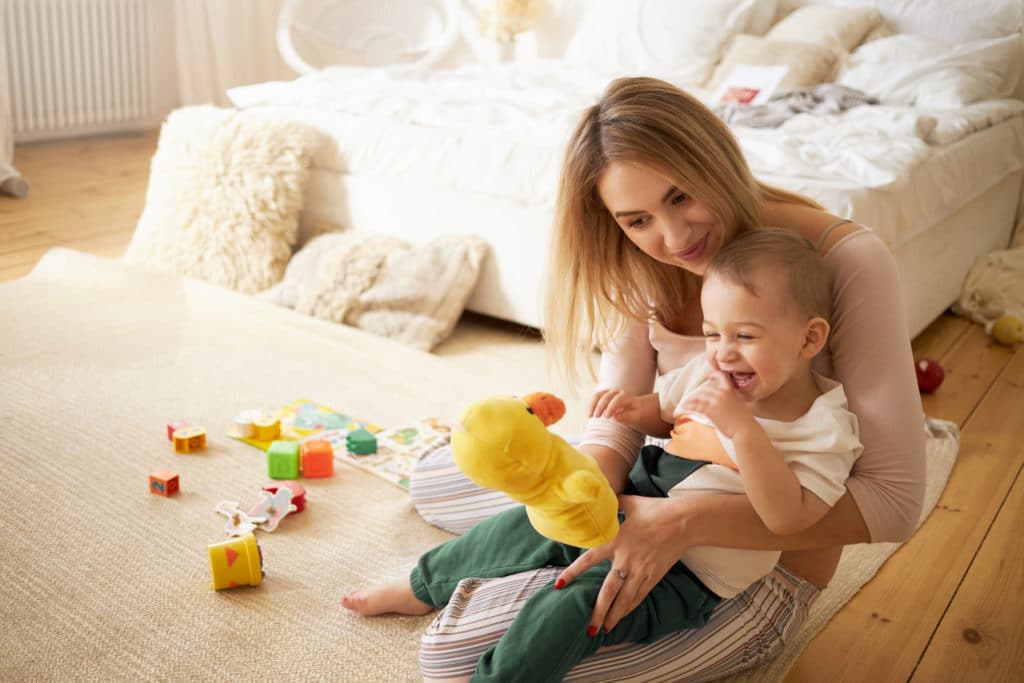The feeling of self-confidence is essentially based on the fact of believing in one's ability to undertake and succeed. This is what allows one to develop self-esteem and thus to flourish and feel good about oneself later on. Moreover, a child's self-confidence is not innate. It is cultivated, built, acquired and developed. And this, from a very young age, through a progressive and continuous process. This process begins with the child's very first actions with his parents. The environment, the family and the school, are then the first environments of the child. It is from there that he will feed himself by drawing and cultivating his self-confidence in order to build himself little by little.
On this subject, many parents ask themselves how to help their child to build his self-confidence? Or how to help your child to be more confident? To help you see more clearly, Kidlee shares with you its small selection of tips and tricks to build and boost the self-confidence of your child!
The role of the parent and the babysitter in the development of the child's self-confidence :
First of all, it is good to know that it is easier for younger children to gain confidence. The child is like a neutral ground that absorbs and learns from everything around him. The most important thing is that the child has the support and the framework to build, strengthen and develop his self-confidence. And it is up to you, dear parents, as well as to you, dear babysitter, to play this role. Indeed, who better than you, parents and babysitter who are with your child on a daily basis, can help him/her build and develop this essential skill that is self-confidence?
From birth, the child has this capacity to welcome and discover new things and new ways of doing things. And this, without seeing the obstacles or preconceptions. This begins with the first interactions between the child and the parent or babysitter. The soft words, the tenderness, the reassuring looks and the appreciation that are given to the child from a very young age, allow the child to build himself. And thus, to be initiated to self-confidence. Like his first steps for example. The more he takes them with you, the more he progresses and then manages to walk on his own like a grown-up. It is on this same path that the child's self-confidence is built every day.
The role of the parent and the babysitter is to guide, support and boost the child in his quest for confidence and self-esteem throughout his various stages of development.
Keys to the development of a child's self-confidence :
Banning anything that can alter a child's self-confidence:
The younger the child, the easier it is to disrupt his or her self-confidence. Being receptive to his surroundings, the child can lose confidence and self-esteem in the face of certain factors. Such as criticism, blame, being put in a difficult position, comparison with other children or even harassment.
How to detect a lack of self-confidence in a child?
Let's start at the beginning, in order to help your child gain confidence, it is important to detect the signals that do not deceive. By observing your child on a daily basis, you will be able to detect these signs of lack of self-confidence or self-esteem in your child.
What are the telltale signs?
- Showing a constant fear of everything: The child is afraid of trying out new things or new actions.
- A real lack of initiative: the child lacking in self-confidence does very little on his own: tries a new game at the park, dresses himself, puts his things away...
- High shyness: the child does not reach out to others and has difficulty integrating into the community or during group activities
- A devaluation of his person: Before even doing something, the child believes that he won't be able to do it, that he doesn't have the ability to do it, that he's not up to it... so he finds a thousand excuses not to do the task. Like homework, for example.
- A search for parental approval: children never act on their own. They constantly need the presence or intervention of their parents before starting anything.
It is also by observing your child that you will be able to identify those situations where he/she may lack confidence. You can then propose appropriate solutions and help them overcome their fears. To do this, you can start by creating a routine at the end of each day after school. Around dinner or before bedtime. Through this ritual, your child can tell you about his day. At the same time, he will tell you about his apprehensions on this or that subject but also about his daily achievements and discoveries.
The fact of revealing itself will help the child to face the obstacles which it meets. But also to visualize them from another angle in your company in order to find solutions together. In addition, by talking to your child on a regular basis, you are helping him or her to become aware of his or her strengths and abilities on a daily basis.
To boost your child's self-confidence: be positive, reassure and value them!

Your word is worth gold in the eyes of your child. It is then important to show support, tenderness, positivity and encouragement to the child during all moments of life. Especially when the child lacks confidence and makes mistakes.
It is first essential to play down the situation in case of fear or failure in order to reassure the child. Help them to have a positive vision of things by explaining that it is normal not to succeed at the first attempt. That it's not a big deal. That he will get there in the end. And above all, that he is still very young and still learning.
Expressing your pride, confidence and encouragement promotes motivation and is just as effective in encouraging your child to naturally undertake new things without fear of making mistakes. This will strengthen his self-esteem, develop his autonomy and help him gradually gain confidence.
We focus on the effort and not on the result
To help your child build confidence or self-confidence, it is more interesting to value and encourage the process of the action rather than its result. In other words, whether or not your child succeeds in what he or she does, the most important thing to do to boost self-esteem and confidence is to acknowledge the effort, strategies and choices made.
Instead of congratulating him because he had a good result. It is indeed more fruitful to congratulate and compliment the way he acted to try to achieve his goal. The same is true for failure. For example: ''You thought well, you made the right choice, you did the right things and so you succeeded...''. If not: ''You made a lot of effort, you did well, you learned new things and next time it will be even better!
Hailing the process instead of the outcome teaches the child a developmental mindset. In this way, he understands that he must try, go for it, and learn from his experiences regardless of the results in order to do better in the future. In this way, he will also learn that even the most competent people work hard, give it their all and overcome their fears to achieve their goals.
We are less overprotective and we encourage his autonomy!
The more autonomous a child is, the more self-confident he or she is and vice versa. This works both ways and in a complementary way. But as parents and even as babysitters, we often tend to overprotect our youngest children, especially the youngest. This has a significant impact on the development of their independence. And overprotecting a child can quickly lead to a loss of self-confidence and on the other hand create a dependency and a lack of initiative that can be detrimental in the future.
We prohibit less and accompany more!
Stopping the child and doing things for him discourages and sends a negative message about his abilities. As Maria Montessori pointed out, instead of overprotecting a child or doing things for him, it is better to "help him to do things by himself". And from a very young age. For example: if the child wants to climb the sofa to get to the top, don't stop him in his tracks. Instead, secure the space with cushions, for example, stay by his side and let him learn to climb on the couch by himself. This will not only help develop his motor skills and independence, but also gradually build his self-confidence. You can even encourage him with a little: "Go for it! You can do it!
Allowing children to freely explore the environment around them will make them more confident and more likely to go further in their development. Instead of saying no and forbidding, it is better to secure and support the child in what he/she is doing.
Promote autonomy by letting the child learn on his own:
We may be repeating ourselves, but children are born explorers! It is therefore important to let them learn by themselves. This can be at home, at school, outdoors or even through play. In fact, it is through play that children learn the most. It is through play that children learn the most, because it trains many skills such as motor skills, thinking, decision making, logic and especially autonomy. Therefore, it would be better to accompany him if he wants to try a game that involves some risk. Instead of systematically refusing him access to this activity, be his guide while securing the perimeter. The same goes for small everyday activities. Like getting dressed on his own, putting away his toys or setting the table. Start by guiding him in his movements and then let him do it alone to learn step by step.
To build your child's assertiveness, try involving your child in family life little by little. Or in the decisions to be made on a daily basis. Giving your child responsibility, encouraging his initiative and his ability to make his own choices, will help him to know himself better, to know his tastes and then to assert himself in a group.
The self-confidence workshop: these games and activities are proven to be effective!

In order to build and reinforce the child's self-esteem and self-confidence, also opt for support activities. These activities develop the child's ability to express himself, his autonomy and his sense of inner security.
Through this little improvised workshop, Kidlee has concocted a mini selection of games and activities to do as a family. And whose goal is to develop the self-confidence of your child. Let's get started!
Effective games to boost self-confidence while having fun:
- Course or no course? : easy, fun and can be done anywhere and anytime.
- Role-playing games : theater, puppets, disguises, the perfect equipment to reveal and express yourself while having fun.
- The self-confidence game: a little nugget proposed by Positive Dad to download just HERE !
The relaxing activity that builds and centers confidence: Yoga for kids
Yoga is a great exercise to relieve stress and anxiety. It allows the child to focus on himself and calm his mind. In addition to improving stress management and coordination, this activity based on relaxation, allows the child to develop body awareness. It improves concentration and above all increases self-confidence and self-esteem.
Discover our article: Yoga for kids: everything you need to know to introduce your child to yoga!
Find our selection of yoga postures for children just HERE !
Our favorite: the journal of successes and gratitudes:
A great ritual to do as a family, the notebook or diary of successes is an excellent way to cultivate and strengthen self-confidence. And above all to be happier. The resulting gratitude is indeed a very powerful positive feeling. It quickly influences the level of happiness.
The goal is simple, choose a nice notebook and write your child's name in it. Every day at the same time, write down 3 things that your child is happy to have. In other words, 3 things that inspire gratitude. Then add 3 "small successes" of his day (a good grade, tidy his room ...). And so on, according to your choice and your taste, the exercise of gratitude has no limits.
Download a great success booklet for kids just HERE !


